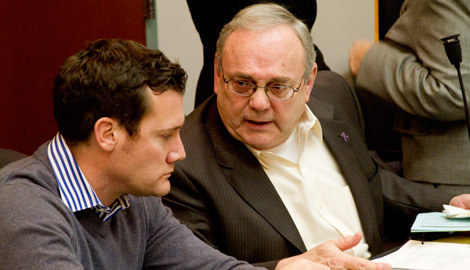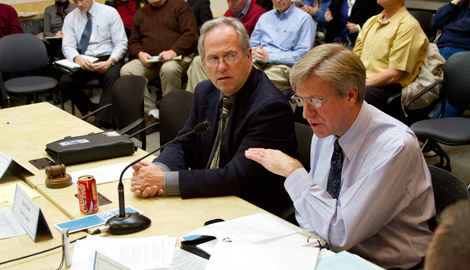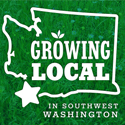While Washington State is facing its worst financial crisis in decades, transportation funding has remained relatively robust. Over the next eight years, though, existing transportation budgets will face a $1 billion shortfall, and new infrastructure could require between $10 billion and $30 billion in additional revenue.
This was the mixed news shared by government affairs consultant Mark O. Brown before a meeting of the Southwest Washington Regional Transportation Council (RTC) board of directors on Jan. 3 in Vancouver.
RTC is the metropolitan planning organization for Clark County and the Regional Transportation Planning Organization for Clark, Skamania, and Klickitat counties.
Brown is president of Connections Public Affairs in Lacey and also the city of Lacey’s former mayor. He represents a number of Clark County cities at the state capitol, including Vancouver and Battle Ground. Additionally, he was appointed by Gov. Chris Gregoire in October to serve on the Washington State Parks and Recreation Commission.
Brown said all eyes are on Gregoire, who is due to unveil a supplemental transportation budget during the upcoming 2012 regular legislative session, which officially begins Jan. 9.
However, Brown added, the $1.5 billion dollar shortfall in the state’s general fund (SGF) will certainly dominate the proceedings.
“The SGF will suck most of the oxygen out of the air,” Brown said. “We’ll work hard so that we don’t lose anything that is already approved.”

Vancouver Mayor Tim Leavitt and County Commissioner Tom Mielke confer at the Jan. 3 RTC Board meeting.
Transportation funded for short term
Because transportation projects are funded primarily as a result of recent increases in the gas tax – the 5 cent “Nickel” package in 2003 and the 9 cent per gallon boost as part of the 2005 Transportation Partnership Program – the Washington State Department of Transportation (WSDOT) has had solid funding.
In Clark County alone, WSDOT has completed 13 of 19 scheduled projects since 2003. The cost, including additional federal and local funding, will total $781.1 million by 2017.
Projects include construction of an interchange at the intersection of Interstate 5 and SR 502, additional lanes on SR 14 near Camas and Washougal, and the Ridgefield interchange at I-5 and SR 501.
More good news is that WSDOT has managed to come $111 million under budget on the projects.
But most revenue goes toward debt service
The downside is that 90 percent of current revenue is dedicated to paying debt on the bonds used for the existing projects. Without new sources of revenue, maintenance will suffer and there will no money for major projects, such as construction of the $10 billion* Columbia River Crossing Light Rail project (CRC).
WSDOT has budgeted $102.4 million for the design phase of the CRC in its 2011–2013 biennium, and will seek $60 million more from Gregoire’s supplemental budget. Ultimately, the state Legislature is expected to contribute $450 million toward capital costs of the CRC.
Brown doubts CRC funding will be addressed in the 2012 session, except for WSDOT’s request to have the I-5 Bridge designated as an official tolling facility.
As for existing projects, Brown said the chairs of the House and Senate transportation committees are determined to protect them.
“I think we’re in fine shape,” Brown said. “We need to be vigilant in completing all of those projects.”

RTC Executive Director Dean Lookingbill gestures as Clark County Commissioner and RTC Board chair Marc Boldt looks on.
Task force recommends billions more in taxes and fees
RTC Executive Director Dean Lookingbill provided the board with an update of recommendations put forth by a special task force appointed by Gregoire in July to analyze potential revenue sources for future transportation needs.
The so-called Connecting Washington Task Force, which included elected officials and private business people primarily from the I-5 corridor, produced a menu of potential tax and fee increases representing between $10 billion and $30 billion in potential new revenue through 2023.
Proposed revenue sources included increases in the state fuel tax, motor vehicle excise tax, drivers’ license fees, gross vehicle weight fees, vehicle title fees, and the hazardous substance tax. The task force also listed the possibility of granting local city councils or county officials autonomy to impose local gas taxes and tolls.
The recommendations were passed onto the governor, who is expected to release her final report any day now.
“This is where they landed, but it’s far from a recommendation,” Lookingbill said.
Leavitt appears intrigued by local gas tax options
The idea of enacting a local gas tax caught the attention of Vancouver Mayor Tim Leavitt, a member of the board. He said that early in the planning of the CRC, the option of a local fuel tax came up but was deemed insufficient as a funding source. Now it looks like the task force was suggesting greater local authority to revisit implementing local fuel taxes.
“There is still a lot of heartburn over placing tolls,” Leavitt said. “What is lacking is possible alternatives.”
Brown clarified that the ability to impose a local gas tax would be available to city and county government as currently proposed.
“In terms of a local option fuel tax specifically…this would be given as an option at city and county level,” Brown said.
Leavitt asked if such a fuel tax would require a vote, or could be council approved.
“You always have the option [of a vote],” said Brown, “but you wouldn’t have to get voter approval based on what is on the table at this time.”
* The well-documented cost to taxpayers, if the CRC stays on budget, is $10 billion. This was established by the Cortright Report (PDF) which used data from an independent review panel hired by the governors of Washington and Oregon. (View the panel’s final report.)
See our continuing coverage of the Columbia River Crossing Light Rail project.
Do you have information to share on the CRC? To respond anonymously call 260-816-1426. To allow your comments to be used on COUV.COM call 260-816-1429.









